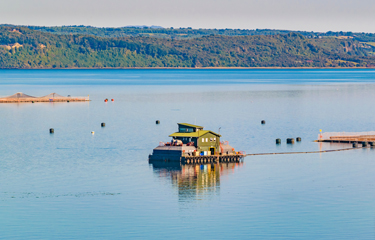In an attempt to curb the further spread of COVID-19, Chile’s Health Ministry (Minsal) has declared the southernmost city of Puerto Williams under quarantine and the closing off of the Island of Chiloé, where much of the country’s salmon farming takes place.
The measure is in addition to those previously announced for other areas of the country, including Chillán and Easter Island, San Pedro de La Paz, and Caleta Tortel – towns where the entry and exit of people has been prohibited, with the exception of those who work in areas deemed essential for supplies, provision of critical services and health services.
According to Diario Financiero, the move in Chiloé is in response to local residents objecting over what they see as the government’s failure to control the flow of trucks belonging to the salmon farms entering and leaving the island. Protesters, who have blocked off highways, said that procedures implemented are insufficient to determine whether the truck drivers have been infected with COVID-19.
Chilean salmon firm Camanchaca is currently evaluating the effects the newly implemented measure could bring.
"The important thing is [for the measures to] be applied rigorously: That they be effective in stopping infections, but also that they be effective in allowing logistical continuity so that there is no economic collapse on the island," Camanchaca President Ricardo García said.
“Truck transport is a reality in Chile and in the rest of the world, and that’s why it is obvious that it should be allowed. Otherwise, we are headed for ruin,” he added. “The community benefits from this transport, and must also be able to reduce the risks of contagion. Both things are compatible.”
In turn, Arturo Clement, president of trade association SalmonChile, praised the industry’s “tremendous efforts to adopt extraordinary measures in labor and health issues to prevent contagion," on Twitter.
Meanwhile, the National Fisheries and Aquaculture Service (Sernapesca) is streamlining procedures and taking steps for the fishing industry to be able to continue functioning during this emergency situation.
The fishing authority recently signed agreements with its peers in Argentina and Brazil to enable online certification procedures for exports to the respective markets of products intended for human consumption. Officials that normally handle these procedures may be under preventive quarantine in order to help stop the spread of coronavirus.
Photo courtesy of DFLC Prints/Shutterstock







